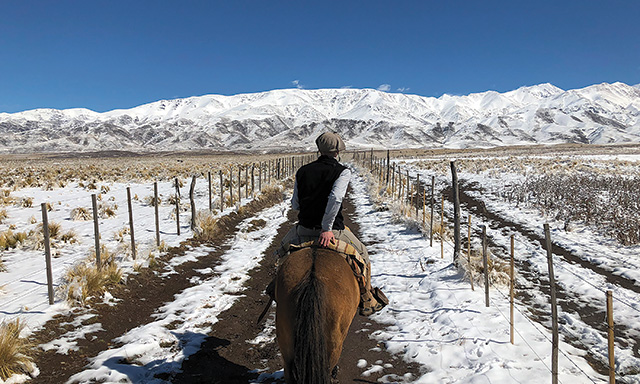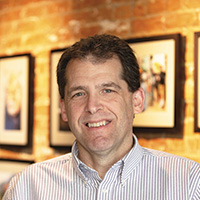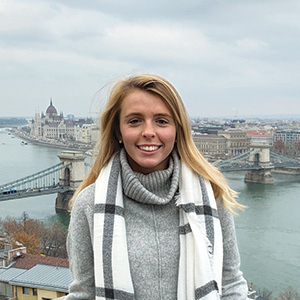Pulteney Street SurveySpring 2019

Horseback Riding in the Andres - Mendoza, Argentina
Photo by Emma Honey '20
Choose Your Own Adventure

"It's how you go abroad that dictates what you get out of the experience, so we want students to think intentionally about what's possible." - Dean of Global Education Thomas D'Agostino P'15
When Thomas D'Agostino (right) arrived at HWS, he was charged with establishing what has become a vital and fruitful study abroad partnership with Union College. His other undertaking was loftier: "to help our students have a more enriching, more meaningful study abroad experience," he says. "It's how you go abroad that dictates what you get out of the experience, so we want students to think intentionally about what's possible."
With the help of faculty and staff, the CGE team has developed unique pre-departure and reentry programs aligned with the breadth and depth of the HWS curriculum. The "adjustment skills and intercultural competencies" at the heart of that programming are contextualized against the backdrop of students' personal goals, which "significantly enhances someone's study abroad experience," says Jennifer O'Neil, the Colleges' pre-departure and reentry programming coordinator.
CGE's constellation of pre-departure preparation is integrated with orientation meetings with faculty and staff, coursework, language instruction and cultural primers to ensure students decide deliberately what, where, how and most importantly why they are studying abroad. Along with CGE's goal-setting workshops, O'Neil explains, students leave campus equipped with "realistic goals, potential resources and a tentative plan [so they can] hit the ground running and make the most of every moment abroad."
For Gabby Fraser '20, a semester abroad in Beijing was not only the next practical step in learning Chinese but also an opportunity to better grasp China's environmental policies and narrow career possibilities around "something as pressing as climate change and international relations."
After visiting the United Nations the summer before she left for China, Fraser says she realized that "the wheels turn slowly and it's difficult for people especially on the outside to see the changes." A global environmental politics course in Beijing, she says, piqued her interest in sustainable building and clarified her curiosity about development work at "the level where I can see impacts and at the same time contribute to broader projects."
"A student can come to HWS and get an awesome education on campus," says Associate Professor of Biology Meghan Brown, who has led programs to Siberia, Australia, New Zealand and Guatemala. "But embedded learning in a different location catalyzes and crystallizes student interest, both when they return to HWS and after graduation."

While Fraser was exploring the politics of the world's sustainability challenges in China, Emily Lorimer '20 (right) was debating solutions to terrorism and refugee resettlement crises at NATO headquarters in Brussels. At a model assembly, Lorimer and her peers addressed a hypothetical terrorism and migration crisis on a fictional Mediterranean island. Based on recent and ongoing issues in the region, the simulation mirrored a meeting of the Operations Policy Committee, "one of the primary committees that report to the North Atlantic Council, the primary decision-making body of NATO," Lorimer explains.
Each student represented a country and was given "three crisis military response operations" to the fallout of a terrorist attack on the fictional island. Each member, Lorimer says, "had to come to the conclusion of which response our country would endorse, given their public and foreign policy doctrines."
Building on coursework going back to her first year at HWS, Lorimer's studies abroad have informed her burgeoning Honors project, which will focus on counterterrorism strategy within the European Union.
"What particularly interests me is the role of the internet in radicalizing young people in western nations and encouraging them to commit acts of terror having never left their home country," says Lorimer, who plans to explore the role of the internet in combatting extremism. "This has been an issue for Brussels in recent years and having spent substantial time [there] I want to research it and help come to a solution."
When Professor of Economics Scott McKinney P'13 led a semester abroad to Ecuador and Peru in 2017, the courses he taught juxtaposed the cultural and environmental history of the region with contemporary challenges. The goal, he says, was for students to take ownership of what they were learning, to "keep their study abroad experience in mind when it is their turn to make decisions that affect Ecuador, Peru, Latin America and other places in the world that are not the U.S. ... [to make] decisions in terms of friends and families, people and places that they knew when they were abroad, rather than in terms of abstractions that mean nothing to them."
In 2000, a grant from the Andrew W. Mellon Foundation helped establish the "Partnership for Global Education" between HWS and Union College, broadening the menu of offcampus programs and enabling both institutions to "make great use of our shared resources," D'Agostino says. The partnership also set the foundation for the 2014 New York Six International Initiative, a three-year, $1.25 million grant from the Mellon Foundation to support new globalization and language learning collaborations among students and faculty from HWS, Union, Colgate University, Hamilton College, St. Lawrence University and Skidmore College.
